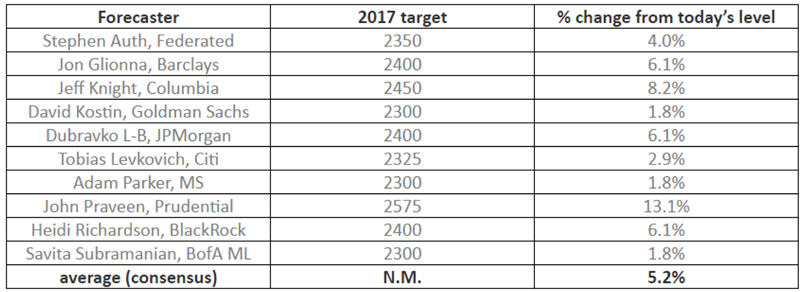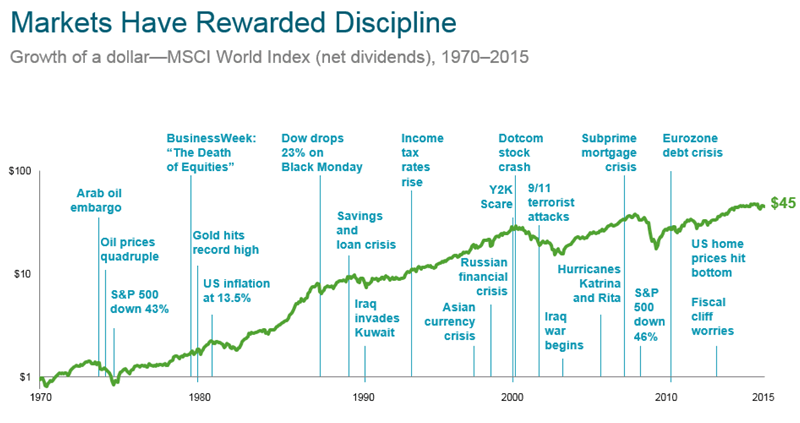Mitchell Barr, Client Associate
2017 is underway and we are granted the opportunity for a fresh start in a new year. Many of us made New Year’s resolutions to effect change in our lives for the better. If you are one of those people who believe in turning over a new leaf, I have a suggestion for you—stop looking at your investment portfolio. If you can’t stomach not looking at all, then resolve to look less often than you did last year. The idea might seem scary and even crazy to not watch your money like a bear protecting its cub, but please, hear me out. You may even have more time and energy to spend doing the things you love, rather than stressing out and worrying about the markets.
On what grounds am I recommending that you play golf instead of watching the ticker tape? It’s because at Versant Capital Management we invest in broadly diversified investments that cover entire markets. A typical portfolio for a Versant client will hold thousands of unique stocks, bonds, and alternative investments from all over the world. This isn’t because we aren’t smart enough to consistently forecast market returns, it’s because nobody is smart enough to consistently forecast market returns.
Every year we are presented with predictions from pundits and journalists that say the stock market is going to experience a monumental crash and Armageddon will surely ensue. Every year there have been new books published touting the next economic or market catastrophe. In 2016, we were serenaded by the following prophecies:
- Rich Dad Author Says the Market Collapse he Foresaw in 2002 is Coming
- The Market Will Drop 20% in 2016
- The Biggest Stock Market Crash in a Generation
Where did we end up at year-end? The global stock market (MSCI ACWI) was up 7.86% and the S&P 500 was up 11.96% (Source: Morningstar). These ridiculous forecasts might be correct every 30 years or so, but it’s not worth your time or mine to guess when that will be. The only thing worse than doomsday chicken littles is the success rate of actual Wall Street strategists in forecasting market returns. In a much-heralded article called “Strategists: Full of Bull” by Salil Mehta, he found that over the course of the last eighteen years, strategists have been overly optimistic, as they forecasted a positive return for the U.S. stock market about 92 percent of the time. The average guess was 9 percent, whereas the actual return was about half of that. Keep in mind that this period encompassed the 2001 tech bubble and the 2008 subprime mortgage crises, and not one firm included in the survey forecasted a negative return for the S&P 500 in either of those years.
In a follow-up to his article, Mr. Mehta presented S&P 500 forecasts for 2017 and it comes as no surprise that everyone so far is positive and the variation between the lowest and highest forecast is 11.3 percent. How useful would it be if you were told that your one-million-dollar portfolio will either increase $18,000 or $131,00 next year, so we will just guess that it will be somewhere in the middle?

Source: Barrons
In the data Mr. Mehta collected, only 8 percent of all forecasts were negative over the entire period, when in reality, the S&P 500 has a down year about a third of the time. In fact, their accuracy is so bad; he concludes that strategists are correct less often than a stopped clock, which is at least correct twice a day! These two forecasting extremes go to show that no one has the slightest clue where the market is heading one year out, and the entire process is just a popularity contest for screen time and clicks on the internet. You can drive yourself crazy entertaining the possibilities about what could happen, but that time might be better spent shopping or having a nice dinner with your spouse.
So, if it’s impossible to know what the market will do in 2017, what do we do? Another researcher named Philip Tetlock has dedicated his career to improving the traditional forecasting model. Based on 20+ years of research on what makes a forecaster successful, he has laid out a blueprint for making better predictions in his book Superforecasters. His advice is to focus on questions that you have a chance of forecasting correctly. For example, we believe we have a better idea of what will happen to markets over the next 5 to 10 years, compared to just this year. We expect they will go up and you will make money, unless current valuations are extremely extended. Who would invest in the market if they thought otherwise? For a historical perspective, look at this chart from Dimensional Fund Advisors that shows the growth of the world stock market over the past 35 years:

Source: Dimensional Fund Advisors
There have been myriad events over the years that have affected the markets in the short-term, but 1 dollar invested in 1970 would be worth 45 dollars today. All it would have taken to capture that gain is a little discipline and patience, not a crystal ball. 2016 had many surprising events, including:
- The S&P 500 recorded the worst start to a year in history by dropping 8% in the first 10 trading days.
- Britain shocked the world by voting to leave the European Union in the Brexit referendum.
- Donald Trump won the U.S. Presidential Election.
- The Chicago Cubs won the World Series (Go Cubs Go!).
Many of these 2016 events and in the past 35 years were highly unlikely or completely unpredictable, which leads to Tetlock’s characteristics of a successful forecaster: be cautious, be humble and believe that nothing is “meant to happen.” With these points in mind, we lay the foundation for a portfolio by buying the whole market, because nothing is certain. Then, we make small bets based on what we expect in the next 5 to 10 years, but check the ego at the door. And, when the circumstances change, we change our forecast.
By taking this approach, we don’t need to bother with Wall Street bulls or doomsday predictions, and can instead focus our energy on questions that matter, such as, “Will you have enough money to last the rest of your life?” or “What kind of legacy might you leave to your children?” Not to mention that when the times inevitably get tough, we will help you stay disciplined and focused on the long run. In 2017, challenge yourself to look at your portfolio less and enjoy life more, because life is too short to wait for a stopped clock to strike the right time.
[mk_fancy_text color=”#444444″ highlight_color=”#ffffff” highlight_opacity=”0.0″ size=”14″ line_height=”21″ font_weight=”inhert” margin_top=”0″ margin_bottom=”14″ font_family=”none” align=”left”]Disclosure: Please remember that past performance may not be indicative of future results. Different types of investments involve varying degrees of risk, and there can be no assurance that the future performance of any specific investment, investment strategy, or product (including the investments and/or investment strategies recommended or undertaken by Versant Capital Management, Inc.), or any non-investment related content, made reference to directly or indirectly in this newsletter will be profitable, equal any corresponding indicated historical performance level(s), be suitable for your portfolio or individual situation, or prove successful. Due to various factors, including changing market conditions and/or applicable laws, the content may no longer be reflective of current opinions or positions. Moreover, you should not assume that any discussion or information contained in this newsletter serves as the receipt of, or as a substitute for, personalized investment advice from Versant Capital Management, Inc. To the extent that a reader has any questions regarding the applicability of any specific issue discussed above to his/her individual situation, he/she is encouraged to consult with the professional advisor of his/her choosing. Versant Capital Management, Inc. is neither a law firm nor a certified public accounting firm and no portion of the newsletter content should be construed as legal or accounting advice. If you are a Versant Capital Management, Inc. client, please remember to contact Versant Capital Management, Inc., in writing, if there are any changes in your personal/financial situation or investment objectives for the purpose of reviewing/evaluating/revising our previous recommendations and/or services. A copy of the Versant Capital Management, Inc.’s current written disclosure statement discussing our advisory services and fees is available upon request.[/mk_fancy_text]
